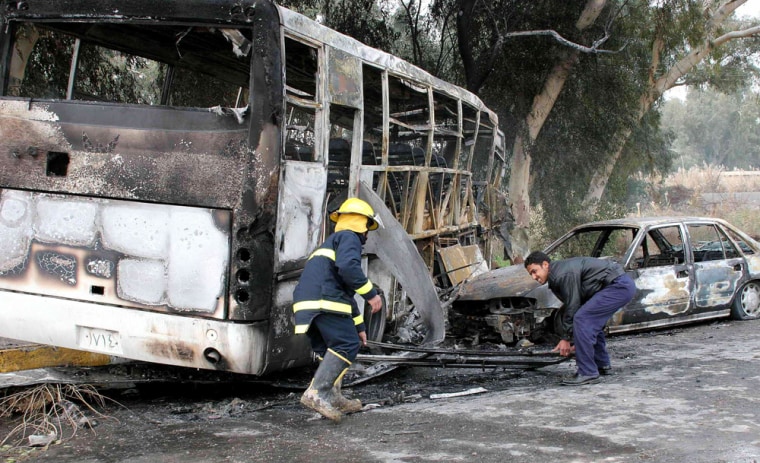Iraq’s main Sunni Arab group made an unprecedented trip north to see the Kurds and agreed Monday for the first time on broad outlines for a coalition government — possibly opening a way out of the political turmoil that has gripped the country since disputed elections.
A promise of Iraqi army protection for tanker truck drivers reopened the country’s main refinery — a last-ditch effort by the Shiite-led government to avert a fuel crisis that has led to deadly riots and the oil minister’s resignation.
The violence that followed the Dec. 15 parliamentary elections was unabated. A suicide car bomber targeted a busload of police recruits north of Baghdad, killing seven people, and gunmen in the capital killed five workers.
As part of the bargaining for a new coalition government, President Jalal Talabani assured Prime Minister Ibrahim al-Jaafari that his fellow Kurds would not object if the United Iraqi Alliance — the Shiite religious bloc that won the most votes in the election — again nominates him for the post.
But it was the agreement struck Monday by Kurdistan regional President Massoud Barzani and representatives of the main Sunni Arab Iraqi Accordance Front that opened the way for a new broad-based government. It also drew the ire of minority parties and secular groups.
“They will be part of a future government,” said Foreign Minister Hoshyar Zebari, a Kurd who sat in on the meetings.
Sunni Arabs and secular parties, such as the one headed by Shiite former Prime Minister Ayad Allawi, have complained the elections were tainted by fraud and intimidation. They have demanded a new vote in some provinces, including Baghdad.
With the agreement, the Accordance Front seems to have broken a pact to only discuss those complaints during their meetings with the Kurds. Opposition groups are waiting for a team of international monitors — which came to Baghdad on Monday — to assess the elections and examine the complaints, which number about 1,500. The U.N. has called the vote credible.
“We were shocked today when we heard that our brothers, who signed agreements with us yesterday to discuss just the fraudulent elections with the Kurdish leaders, instead were discussing forming a national unity government,” Saleh al-Mutlaq, head of the Sunni Arab National Dialogue Front, told The Associated Press.
Accordance Front leaders Adnan al-Dulaimi and Tarek al-Hashimi discussed the shape of a future government with Barzani in Irbil, which in recent days has become a pilgrimage site for southern politicians. The leader of the Shiite religious bloc, Abdul Aziz al-Hakim, visited last week.
“We pray to God to help so that this country may get out of this trial and that it regain stability, security and peace,” said al-Hashimi, who also leads the Iraqi Islamic Party. “These meetings represent important steps in the right direction.”
Al-Dulaimi added that “there is an agreement to form a balanced Iraqi government by consensus and cooperation and away from any sectarian affairs.”
The Accordance Front could be trying to cut out both al-Mutlaq’s group and Allawi’s to form a government with the Shiite bloc and the Kurds.
Final results are expected as early as this week, and the Shiite religious bloc may win about 130 seats — short of the 184 seats needed to avoid a coalition with other parties to elect a president. That election is a prerequisite before a government can be formed.
The Kurds could get about 55 seats, the main Sunni Arab groups about 50 — the Front getting about 40 and al-Mutlaq’s group 10 — and Allawi secular’s bloc could receive about 25.
“This act definitely weakens and distract our claims about the fraudulent results,” al-Mutlaq said of the Accordance Front’s agreement. “I believe they are capable of making a deal with the devil himself so that they can be represented widely in the coming government.”
A deal by the three groups — the Shiite United Iraqi Alliance, the Sunni Arab Iraqi Accordance Front and the Kurdish coalition — could go a long way toward quickly forming a government that would have widespread approval among Iraq’s three main ethnic and sectarian groups, leading to a decrease in violence from Sunni Arab insurgents.
A year ago, it took nearly three months of negotiations between the Shiite religious alliance and a coalition of Kurdish parties to form an interim government after a Jan. 30, 2005, election that was boycotted by the Sunni Arabs.
Fuel resumed flowing at Iraq’s largest oil refinery for the first time in nearly two weeks. The shutdown forced stations around the country to ration gas, creating long lines.
“We started to supply the tankers with oil products after the government promised to secure them along the highways,” Ahmed Ibrahim Hamadi said Monday.
Oil Minister Ibrahim Bahr al-Uloum said he resigned after the government last week gave him a forced vacation and replaced him with Deputy Prime Minister Ahmad Chalabi following criticisms about sharply increased fuel prices.
